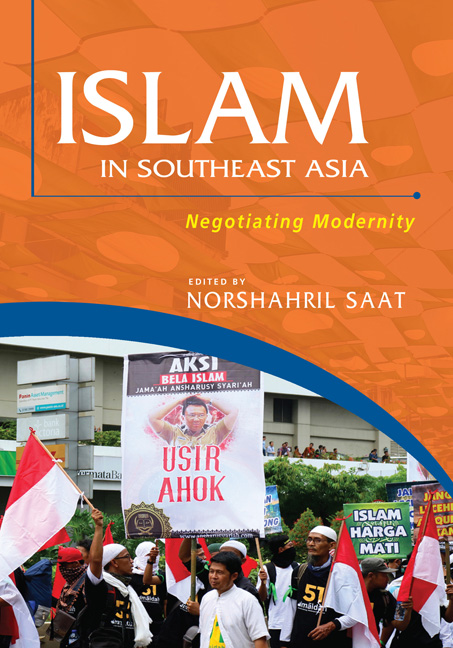Book contents
- Frontmatter
- Contents
- Preface
- About the Contributors
- 1 Introduction
- Section I Malaysia
- Section II Indonesia
- 5 The Middle East Influence on the Contemporary Indonesian “Campus Islam”
- 6 Contemporary Middle Eastern Islamic Thought and its Transmission in Indonesia: A Critical Assessment
- 7 Plural Islam and Contestation of Religious Authority in Indonesia
- 8 Preachers-cum-Trainers: The Promoters of Market Islam in Urban Indonesia
- Section III Singapore
- Index
8 - Preachers-cum-Trainers: The Promoters of Market Islam in Urban Indonesia
from Section II - Indonesia
Published online by Cambridge University Press: 08 June 2019
- Frontmatter
- Contents
- Preface
- About the Contributors
- 1 Introduction
- Section I Malaysia
- Section II Indonesia
- 5 The Middle East Influence on the Contemporary Indonesian “Campus Islam”
- 6 Contemporary Middle Eastern Islamic Thought and its Transmission in Indonesia: A Critical Assessment
- 7 Plural Islam and Contestation of Religious Authority in Indonesia
- 8 Preachers-cum-Trainers: The Promoters of Market Islam in Urban Indonesia
- Section III Singapore
- Index
Summary
INTRODUCTION
Lately, scholars have noted the rise of “market Islam”, which refers to the middle class in many Muslim countries who associate consumption and wealth with Islamic piety (Haenni 2009; Rudnyckyj 2009; Jones 2007, 2010). Muslims have become passionate consumers and producers of “Islamized” products in the last two decades (Roy 2004; Njoto-Feillard 2004, 2012; Adas 2006; Fealy 2008; Nasr 2009; Haenni 2009; Rudnyckyj 2008, 2009, 2010, and 2014b; Hoesterey 2012, 2016). Advocates of market Islam typically have “more open attitudes toward Western management theory, popular psychology, and self-help industries” (Hefner 2012, p. 93). They consider Western management theories promoting self-sufficiency, discipline and entrepreneurship as in line with Islamic morals and ethics. Their encounter with Western management theories was significantly mediated by the massive development of self-help and popular management theory publications in Western countries. These books were then translated into various languages including Arabic and Indonesian (Thrift 1997, 2005; McGee 2005). Some popular Western management publications that were circulated in Muslim countries— including Indonesia—are Stephen R. Covey's 7 Habits of Highly Effective People, Dale Carnegie's Guide to Enjoying Your Life and Work and Robert Kiyosaki's Rich Dad, Poor Dad (Rudnyckyj 2010, 2014a; Hefner 2012; Kenney 2015).
The popularity of self-help and Western management theories cannot be separated from the role of Muslim televangelist-cum-management trainers who have wedded Western management theories with Islamic teachings. In Egypt, these popular Muslim televangelist-cum-management trainers include Amr Khaled, Khaled al-Gendy and Muhammad Abdel Gawad, and they have promoted the entrepreneur subject and self-sufficiency (Atia 2013; Jung, Juul Petersen and Lei Sparre 2014; Zaied 2008). In Saudi Arabia, there is a young trendy preacher, Ahmad Al-Shugairi, the host of a television show called Yalla Shabab (Hello Youth). The show encourages young people to become open-minded and tolerant (Nasr 2009, p. 182; Wright 2011, pp. 176–84). To be sure, one should not discount the influence of Western neo-Pentecostal Charismatic televangelism and self-help gurus have on Muslim preachers (Einstein 2008; Njoto-Feillard 2004, 2012; Thomas and Lee 2012; Rudnyckyj 2010, 2014b; Hoesterey 2012, 2016).
- Type
- Chapter
- Information
- Islam in Southeast AsiaNegotiating Modernity, pp. 164 - 192Publisher: ISEAS–Yusof Ishak InstitutePrint publication year: 2018



